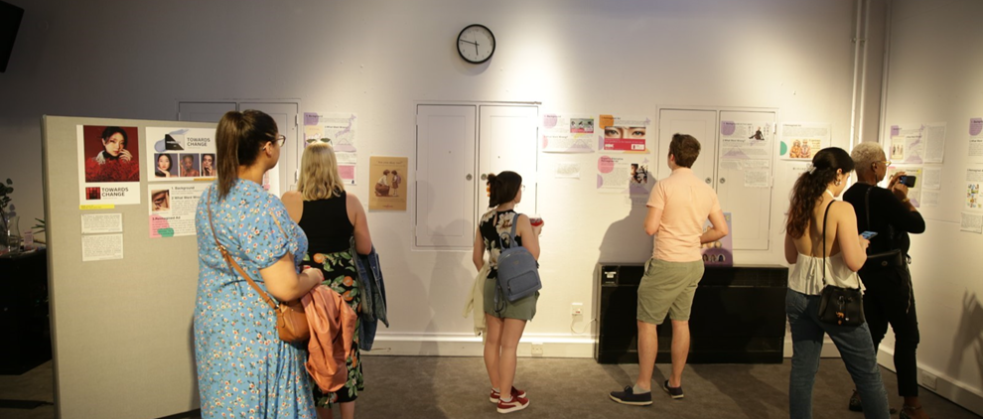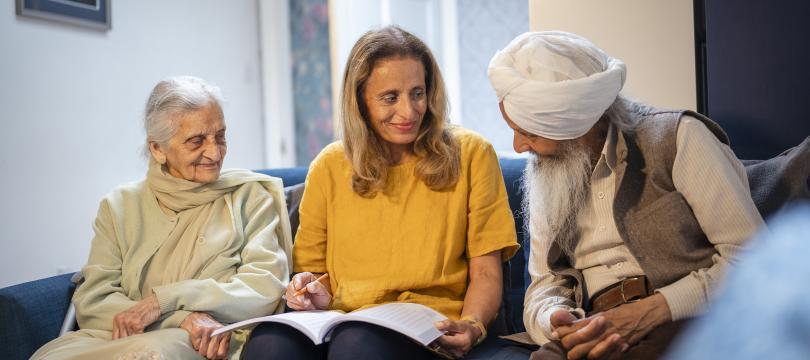Towards Change: Pioneering Community-Driven Solutions to Contentious Advertising
Raisha Jesmin Rafa and Rika Nakamura, Masters students at one of our host universities, the University of Bristol, share their approach to public engagement in a blog about their project ' Towards Change' which aims to reshape the advertising landscape.

In late January, we launched a series of open online workshops for civic and the public in Bristol, prompting them to rethink the problematic representation of various social groups in mainstream advertising. What began as small workshops has evolved into a comprehensive multicultural project galvanizing the support of a wide range of stakeholders, including creative and marketing agencies, activists, professors, and representatives from social organizations spanning the UK and Japan.
Advertisements accompany us from the moment we step into a subway station, follow us as we walk past shopping malls and pop up incessantly as we browse our phones. They act as 'invisible education', often propagating stereotypes and shaping individual perceptions, behaviours, and the larger social fabric. Gender stereotypes, such as those seen in the infamous 'Protein World' ad from 2015, which featured a fair-skinned, curvy-yet-skinny woman in a yellow bikini with the caption 'Are you Beach Body Ready?', remain prevalent in the advertising landscape despite backlash.
Rather than merely criticizing contentious ads, we are seeking to build a more ethical and responsible advertising ecosystem. Central to our objective is a proactive, civic engagement approach that breaks away from the advertising industry's exclusivity and collaboratively reimagines contentious advertisements into powerful messages of positivity and inclusivity. Civic engagement recognises that there is no objective ethical truth, and that the advertising industry therefore needs to engage with the public to ensure that adverts align with norms and values of society in any particular moment in time.
The Need for Reform
The Advertising Standards Authority in the UK is tasked with responding to controversial advertising, such as the Protein World ad that was eventually banned. In 2022 alone, 31,227 adverts were amended or withdrawn, which indicates a need for open and thoughtful discussions on poor advertising practices; contentious ads are rarely examined by industry professionals due to fear of scrutiny and other industry anxieties, thus slowing down the process of reform and perpetuating the cycle of flawed adverts being created and banned. If a civic engagement approach is used from the outset of the ad creation process, it is possible to address these problems and foster more inclusive representation in advertising.
Our Process: Harnessing Civic Engagement
Our civic-engaging project consisted of two steps: the first was a series of workshops, and the second was an exhibition to showcase the reimagined adverts created through the workshops. Our workshops were intended to demonstrate to participants that they could play a crucial role in the ad creation process and equip them with greater awareness of the importance of inclusive representation in advertising, which would encourage them to become more conscious consumers in the long run. The exhibition was to convey the tangible social impact of our initiative by showcasing what we had done and gathering diverse audiences in an open space for productive dialogue.
When we use the term 'civic', the first question that arises is 'who would the person be?' In our project, we identified four groups and assigned the 'optimal' role for each party to ensure inclusivity and diversity, moving beyond merely a 'box-ticking' civic engagement exercise.
- General public: This included any member of the public who need not be interested in or affected by advertising but willing to learn more about advertising norms and practices.
- Social Sector: Social organizations involved mainly with women and related underrepresented communities.
- Experts from Various Fields: Experts broadly comprised members of academia and practitioners in various fields.
- Business agencies and companies: Agencies and companies creating products/ offering services and directly involved with advertisements.
For the first two groups, we prepared the online workshops and offered an educational simulation of the advertising creating process. We selected a range of contentious advertisements from the world which were either banned or deemed controversial in their countries of origin for poor and stereotypical representation of marginalized social communities. The workshop process entailed three steps:
- Dissection: We first showed a banned or contentious ad to the participants and asked them why they thought the ad received criticism.
- Discussion: The participants were then asked about their thoughts on the advertiser's intention was and the potential ethical and social impacts of the ad.
- Creative Brainstorming: The final step involved gathering the participants' ideas on how they would reimagine the ads before proceeding to redesign the ads with creatives and AI software.
Regarding contentious advertising featuring gender stereotypes, we organised a special workshop with women's empowerment organisations such as Bristol Women's Voice and the Women's Equality Party (Bristol, Bath, Avon and North Somerset branch). This gave us the opportunity to listen directly to women's opinions and reimagine a contentious advertisement into one that was well-representative and respectful.
Our educational workshops led to participants reflecting:
- "I joined this to acquire creative skills and consumer insights for my marketing career. These 40 minuets taught me ideas for diversity and inclusion."
- "I was able to learn how advertisements are done, and how advertisers sometimes promote problematic beauty standards, such as equating beauty to having fair skin."
For the third group, we invited experts/ practitioners from business, marketing, sociology, and politics to provide feedback and critiques on the reimagined adverts. This demonstrated our commitment to openness and our willingness to incorporate different perspectives, facilitating ongoing dialogue for a more inclusive society. Some experts noted that civic-driven advertising still has potential for improvement in terms of inclusivity. For example, the outputs from our civic workshops often emphasized the social aspect beyond an advertiser's intention; we received valuable advice from an advertising creative director at a major agency on how to deliver messages more effectively. By involving experts from diverse fields, we were able to create balanced adverts that weaved together both business and social perspectives and identified ways to improve our project offerings.
For the fourth category, we sought sponsorship from business entities, including creative and marketing agencies because we recognised their significant influence in shaping the world through market activities. These organizations, although mainly committed to profit-making, possess the capacity to contribute to societal progress; their support boosted our project as we drew attention from the business community and acquired media exposure that enabled us to upgrade the quality of our exhibition. For example, some agencies offered to sponsor the exhibition venue and printing fees, allowing us to entertain visitors and make an impact as a professional social advertising project.
Towards a Responsible Advertising Future
As we continue our journey, we will grapple with new challenges, but we are also looking forward to new opportunities. Having reached audiences in Japan and the UK, the project now aims to go global and have open conversations with diverse civic and practitioners in hopes of stimulating substantive and sustained change in the world of advertising.

